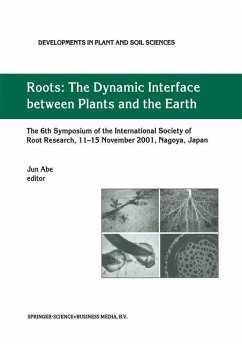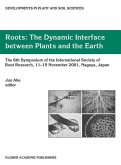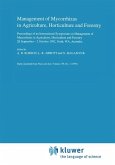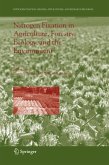Roots
The Dynamic Interface between Plants and the Earth
Herausgegeben:Abe, Jun J.
Roots
The Dynamic Interface between Plants and the Earth
Herausgegeben:Abe, Jun J.
- Broschiertes Buch
- Merkliste
- Auf die Merkliste
- Bewerten Bewerten
- Teilen
- Produkt teilen
- Produkterinnerung
- Produkterinnerung
The root is the organ that functions as the interface between the plant and the earth environment. Many human management practices involving crops, forests and natural vegetation also affect plant growth through the soil and roots. Understanding the morphology and function of roots from the cellular level to the level of the whole root system is required for both plant production and environmental protection. This book is at the forefront of plant root science (rhizology), catering to professional plant scientists and graduate students. It covers root development, stress physiology, ecology,…mehr
Andere Kunden interessierten sich auch für
![Roots Roots]() Jun J. Abe (ed.)Roots163,99 €
Jun J. Abe (ed.)Roots163,99 €![The Supporting Roots of Trees and Woody Plants: Form, Function and Physiology The Supporting Roots of Trees and Woody Plants: Form, Function and Physiology]() StokesThe Supporting Roots of Trees and Woody Plants: Form, Function and Physiology163,99 €
StokesThe Supporting Roots of Trees and Woody Plants: Form, Function and Physiology163,99 €![Management of Mycorrhizas in Agriculture, Horticulture and Forestry Management of Mycorrhizas in Agriculture, Horticulture and Forestry]() Management of Mycorrhizas in Agriculture, Horticulture and Forestry169,99 €
Management of Mycorrhizas in Agriculture, Horticulture and Forestry169,99 €![Root Physiology: from Gene to Function Root Physiology: from Gene to Function]() Root Physiology: from Gene to Function116,99 €
Root Physiology: from Gene to Function116,99 €![Nitrogen Fixation in Agriculture, Forestry, Ecology, and the Environment Nitrogen Fixation in Agriculture, Forestry, Ecology, and the Environment]() Nitrogen Fixation in Agriculture, Forestry, Ecology, and the Environment154,99 €
Nitrogen Fixation in Agriculture, Forestry, Ecology, and the Environment154,99 €![The Supporting Roots of Trees and Woody Plants: Form, Function and Physiology The Supporting Roots of Trees and Woody Plants: Form, Function and Physiology]() The Supporting Roots of Trees and Woody Plants: Form, Function and Physiology154,99 €
The Supporting Roots of Trees and Woody Plants: Form, Function and Physiology154,99 €![Conifer Reproductive Biology Conifer Reproductive Biology]() Claire G. WilliamsConifer Reproductive Biology39,99 €
Claire G. WilliamsConifer Reproductive Biology39,99 €-
-
-
The root is the organ that functions as the interface between the plant and the earth environment. Many human management practices involving crops, forests and natural vegetation also affect plant growth through the soil and roots. Understanding the morphology and function of roots from the cellular level to the level of the whole root system is required for both plant production and environmental protection. This book is at the forefront of plant root science (rhizology), catering to professional plant scientists and graduate students. It covers root development, stress physiology, ecology, and associations with microorganisms. The chapters are selected papers originally presented at the 6th Symposium of the International Society of Root Research, where plant biologists, ecologists, soil microbiologists, crop scientists, forestry scientists, and environmental scientists, among others, gathered to discuss current research results and to establish rhizology as a newly integrated research area.
Produktdetails
- Produktdetails
- Developments in Plant and Soil Sciences 101
- Verlag: Springer / Springer Netherlands
- Artikelnr. des Verlages: 978-90-481-6407-3
- Softcover reprint of hardcover 1st ed. 2003
- Seitenzahl: 476
- Erscheinungstermin: 10. April 2011
- Englisch
- Abmessung: 280mm x 210mm x 26mm
- Gewicht: 888g
- ISBN-13: 9789048164073
- ISBN-10: 9048164079
- Artikelnr.: 32018061
- Herstellerkennzeichnung Die Herstellerinformationen sind derzeit nicht verfügbar.
- Developments in Plant and Soil Sciences 101
- Verlag: Springer / Springer Netherlands
- Artikelnr. des Verlages: 978-90-481-6407-3
- Softcover reprint of hardcover 1st ed. 2003
- Seitenzahl: 476
- Erscheinungstermin: 10. April 2011
- Englisch
- Abmessung: 280mm x 210mm x 26mm
- Gewicht: 888g
- ISBN-13: 9789048164073
- ISBN-10: 9048164079
- Artikelnr.: 32018061
- Herstellerkennzeichnung Die Herstellerinformationen sind derzeit nicht verfügbar.
3. Structural aspects of bulge formation during root hair initiation.- 3. Morphological and physiological characteristics of a root-hairless mutant in rice (Oryza sativa L.).- 4. Growth and cell wall changes in rice roots during spaceflight.- 5. Super roots in Lotus corniculatus: A unique tissue culture and regeneration system in a legume species.- 6. Searching for quantitative trait loci controlling root traits in maize: a critical appraisal.- 7. Relative importance of nodal roots and apical buds in the control of branching in Trifolium repens L..- 8. Biological activities and structure-activity relationship of substitution compounds of N-[2-(3-indolyl)ethyl]succinamic acid and N-[2-(1-naphthyl)ethyl]succinamic acid, derived from a new category of root-promoting substances, N-(phenethyl)succinamic acid analogs.- 9. Jasmonates promote cabbage (Brassica oleracea L. var Capitata L.) root and shoot development.- 10. Silicification of bamboo (Phyllostachys heterocycla Mitf.) root and leaf.- 11. How do roots penetrate strong soil?.- 12. Conservation and divergence of signaling pathways between roots and soil microbes - the Rhizobium-legume symbiosis compared to the development of lateral roots, mycorrhizal interactions and nematode-induced galls.- 13. Influence of pasture management (nitrogen and lime addition and insecticide treatment) on soil organisms and pasture root system dynamics in the field.- 14. Host-specific plant signal and G-protein activator, mastoparan, trigger differentiation of zoospores of the phytopathogenic oomycete Aphanomyces cochlioides.- 15. Reporter genes: applications to the study of arbuscular mycorrhizal (AM) fungi and their symbiotic interactions with plant roots.- 16. A comparison of root characteristics in relation to nutrient and waterstress in two maize hybrids.- 17. Fibrous root turnover and growth in sugar beet (Beta vulgaris var. saccharifera) as affected by nitrogen shortage.- 18. The effects of elevated atmospheric CO2 and soil P placement on cotton root deployment.- 19. Genotypic and environmental variations in root morphology in rice genotypes under upland field conditions.- 20. Regulation of root development in sweetpotato and cassava by soil moisture during their establishment period.- 21. Histological observation of secondary aerenchyma formed immediately after flooding in Sesbania cannabina and S. rostrata.- 22. Physiological implications of ultradian oscillations in plant roots.- 23. Responses of root length/leaf area ratio and specific root length of an understory herb, Pteridophyllum racemosum, to increases in irradiance.- 24. Oxidative stress triggered by aluminum in plant roots.- 25. Rapid changes in levels of mineral nutrients in root-tip cells following short-term exposure to aluminium.- 26. Fine root growth and element concentrations of Norway spruce as affected by wood ash and liquid fertilization.- 27. Rooting strategy of naturally regenerated beech in Silver birch and Scots pine woodlands.- 28. Root system development of Larix gmelinii trees affected by micro-scale conditions of permafrost soils in central Siberia.- 29. Root growth characteristics, biomass and nutrient dynamics of seedlings of two larch species raised under different fertilization regimes.- 30. Growth characteristics of root-shoot relations of three birch seedlings raised under different water regimes.- 31. Seasonal changes in the contribution of root respiration to total soil respiration in a cool-temperate deciduous forest.- 32. Subsoil root activity in tree-based cropping systems.- 33. Tomato root distribution, yield and fruit quality under subsurface drip irrigation.- 34. Effect of organic and inorganic fertigation on yields, ?15N values, and ?13C values of tomato (Lycopersicon esculentum Mill. cv. Saturn).- 35. Non-invasive imaging of roots with high resolution X-ray micro-tomography.- 36. Simultaneous X-ray imaging of plant root growth and water uptake in thin-slab systems.- 37. Comparison of tomato root distributions by minirhizotron and destructive sampling.- 38. Analysis of root images from auger sampling with a fast procedure: a case of application to sugar beet.- 39. A new approach for the quantification of root-cap mucilage exudation in the soil.- 40. Root-pressure driven xylem sap flow in greenhouse melon (Cucumis melo L.): diurnal change and the effects of shading, growth stage, rootstock and fruit number.- 41. Suppression of nitrification and nitrous oxide emission by the tropical grass Brachiaria humidicola.- 42. Root carbon contributions to soil aggregate formation and function.- 43. Root response to mechanical stress in plants growing on slopes: an experimental system for morphological, biochemical and molecular analysis.- 44. Transient resistance to root growth inhibition by moderate water stress: A possible explanation.- 45. Plant health effects of Acremonium root endophytes compared to those of arbuscular mycorrhiza.- 46. Effects of root pruning and root zone restriction on spikelet fertility of paddy rice (Oryza sativa L.) under cool water condition.
3. Structural aspects of bulge formation during root hair initiation.- 3. Morphological and physiological characteristics of a root-hairless mutant in rice (Oryza sativa L.).- 4. Growth and cell wall changes in rice roots during spaceflight.- 5. Super roots in Lotus corniculatus: A unique tissue culture and regeneration system in a legume species.- 6. Searching for quantitative trait loci controlling root traits in maize: a critical appraisal.- 7. Relative importance of nodal roots and apical buds in the control of branching in Trifolium repens L..- 8. Biological activities and structure-activity relationship of substitution compounds of N-[2-(3-indolyl)ethyl]succinamic acid and N-[2-(1-naphthyl)ethyl]succinamic acid, derived from a new category of root-promoting substances, N-(phenethyl)succinamic acid analogs.- 9. Jasmonates promote cabbage (Brassica oleracea L. var Capitata L.) root and shoot development.- 10. Silicification of bamboo (Phyllostachys heterocycla Mitf.) root and leaf.- 11. How do roots penetrate strong soil?.- 12. Conservation and divergence of signaling pathways between roots and soil microbes - the Rhizobium-legume symbiosis compared to the development of lateral roots, mycorrhizal interactions and nematode-induced galls.- 13. Influence of pasture management (nitrogen and lime addition and insecticide treatment) on soil organisms and pasture root system dynamics in the field.- 14. Host-specific plant signal and G-protein activator, mastoparan, trigger differentiation of zoospores of the phytopathogenic oomycete Aphanomyces cochlioides.- 15. Reporter genes: applications to the study of arbuscular mycorrhizal (AM) fungi and their symbiotic interactions with plant roots.- 16. A comparison of root characteristics in relation to nutrient and waterstress in two maize hybrids.- 17. Fibrous root turnover and growth in sugar beet (Beta vulgaris var. saccharifera) as affected by nitrogen shortage.- 18. The effects of elevated atmospheric CO2 and soil P placement on cotton root deployment.- 19. Genotypic and environmental variations in root morphology in rice genotypes under upland field conditions.- 20. Regulation of root development in sweetpotato and cassava by soil moisture during their establishment period.- 21. Histological observation of secondary aerenchyma formed immediately after flooding in Sesbania cannabina and S. rostrata.- 22. Physiological implications of ultradian oscillations in plant roots.- 23. Responses of root length/leaf area ratio and specific root length of an understory herb, Pteridophyllum racemosum, to increases in irradiance.- 24. Oxidative stress triggered by aluminum in plant roots.- 25. Rapid changes in levels of mineral nutrients in root-tip cells following short-term exposure to aluminium.- 26. Fine root growth and element concentrations of Norway spruce as affected by wood ash and liquid fertilization.- 27. Rooting strategy of naturally regenerated beech in Silver birch and Scots pine woodlands.- 28. Root system development of Larix gmelinii trees affected by micro-scale conditions of permafrost soils in central Siberia.- 29. Root growth characteristics, biomass and nutrient dynamics of seedlings of two larch species raised under different fertilization regimes.- 30. Growth characteristics of root-shoot relations of three birch seedlings raised under different water regimes.- 31. Seasonal changes in the contribution of root respiration to total soil respiration in a cool-temperate deciduous forest.- 32. Subsoil root activity in tree-based cropping systems.- 33. Tomato root distribution, yield and fruit quality under subsurface drip irrigation.- 34. Effect of organic and inorganic fertigation on yields, ?15N values, and ?13C values of tomato (Lycopersicon esculentum Mill. cv. Saturn).- 35. Non-invasive imaging of roots with high resolution X-ray micro-tomography.- 36. Simultaneous X-ray imaging of plant root growth and water uptake in thin-slab systems.- 37. Comparison of tomato root distributions by minirhizotron and destructive sampling.- 38. Analysis of root images from auger sampling with a fast procedure: a case of application to sugar beet.- 39. A new approach for the quantification of root-cap mucilage exudation in the soil.- 40. Root-pressure driven xylem sap flow in greenhouse melon (Cucumis melo L.): diurnal change and the effects of shading, growth stage, rootstock and fruit number.- 41. Suppression of nitrification and nitrous oxide emission by the tropical grass Brachiaria humidicola.- 42. Root carbon contributions to soil aggregate formation and function.- 43. Root response to mechanical stress in plants growing on slopes: an experimental system for morphological, biochemical and molecular analysis.- 44. Transient resistance to root growth inhibition by moderate water stress: A possible explanation.- 45. Plant health effects of Acremonium root endophytes compared to those of arbuscular mycorrhiza.- 46. Effects of root pruning and root zone restriction on spikelet fertility of paddy rice (Oryza sativa L.) under cool water condition.








